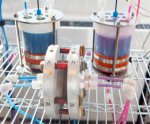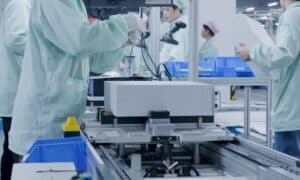Researchers at Harvard University have developed a metal-free flow battery that relies on the electrochemistry of naturally abundant, inexpensive materials.
Flow batteries are large-scale liquid batteries in which all electroactive components are dissolved in the electrolyte. The liquids are stored in two tanks and the electrodes in a separate chamber. Pumping solutions in one direction charges the battery and the other direction discharges it.
Most of these mixes use expensive materials such as vanadium; although some cheaper concepts are being developed such as the “Rustbelt” flow battery.
The Harvard development uses no metals at all. Instead, it utilises carbon-based molecules called quinones, which are similar to those that store energy in plants and animals. The quinones used in this flow battery are almost identical to quinones in rhubarb.
The Harvard team says their organic flow battery already performs as well as vanadium batteries, and at a fraction of the price.
While flow battery technology is usually geared towards utility scale applications; Harvard’s creation could also have potential for home energy storage.
“Imagine a device the size of a home heating oil tank sitting in your basement,” says Michael Marshak, a postdoctoral fellow at Harvard’s School of Engineering and Applied Sciences.
“It would store a day’s worth of sunshine from the solar panels on the roof of your house, potentially providing enough to power your household from late afternoon, through the night, into the next morning, without burning any fossil fuels.”
The next steps for what is currently a bench-top project will be to further test and optimize the system to bring it toward a commercial scale prototype.
“A safe and economical flow battery could play a huge role in our transition off fossil fuels to renewable electricity,” says Harvard SEAS’s Michael J. Aziz. “I’m excited that we have a good shot at it.”
Source/image source












































